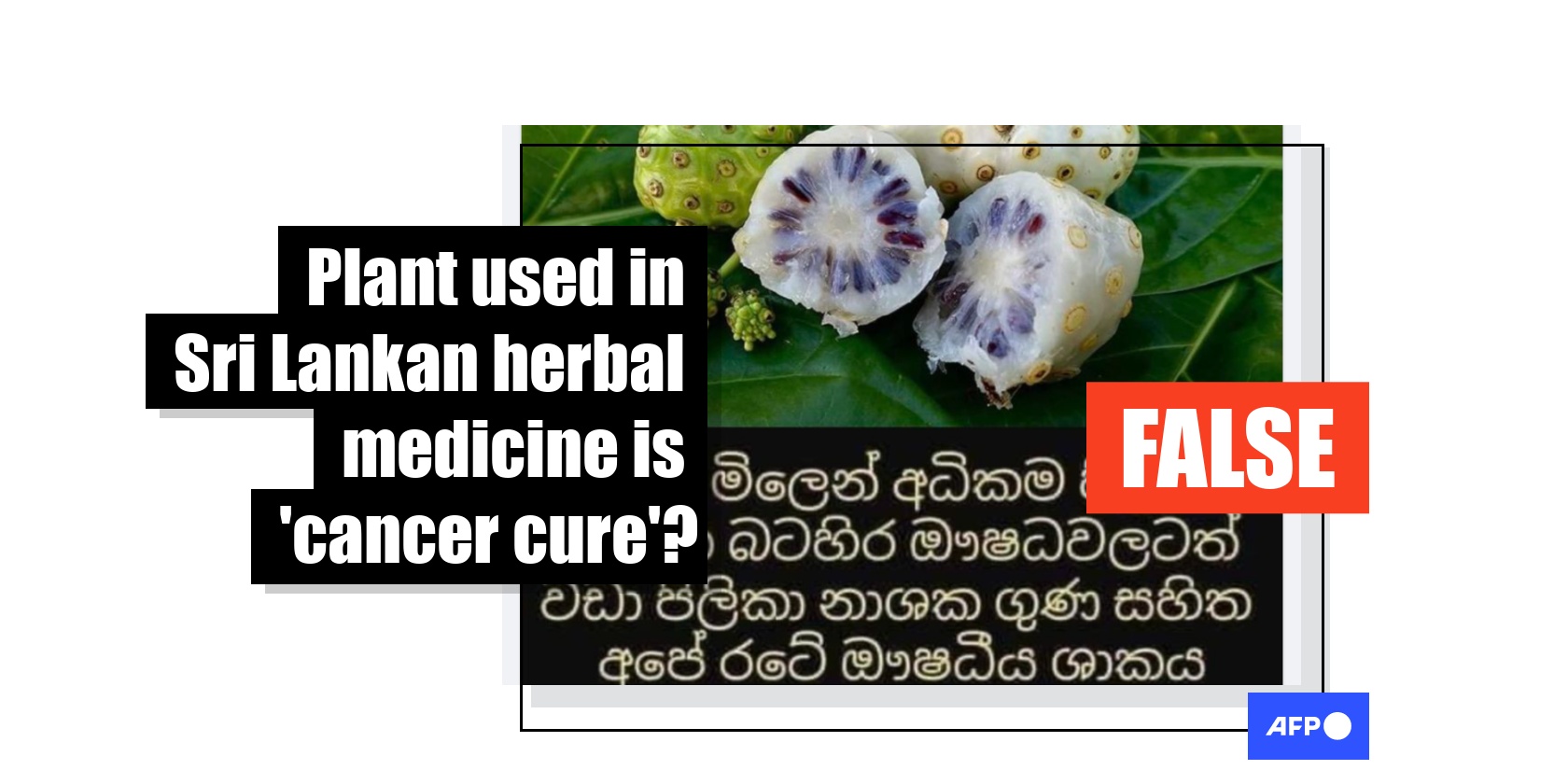
Plant used in Sri Lankan traditional medicine cannot treat or cure cancer: experts
- This article is more than two years old.
- Published on March 15, 2023 at 08:32
- 3 min read
- By AFP Sri Lanka
The lengthy Sinhala-language post was published here on Facebook on March 6, 2023.
It claims the morinda citrifolia tree -- known locally as ahu -- contains powerful cancer-eradication properties.
Shared more than 26,000 times, the Sinhala-language text superimposed on an image of the plant translates to English as: "Our herbal plant that has more cancer eradication powers than the most expensive Western medications".
The post's caption reads in part: "It has been proven as a plant with cancer eradication properties - it's even more powerful than Erlotinib, a drug prescribed (to treat some cancers) in Western medicine.
"It can be used as a pain killer, it strengthens the immune system, and is a powerful medication to treat cancer / It has the ability to eradicate primary cancer cells and eradicate it."

An identical claim was made in multiple other false posts on Facebook, including here and here.
Although the plant is sometimes used in Sri Lankan ayurveda medicine, it is not recommended for the treatment of cancer patients, said Dr L. P. A. Karunathilake, a senior lecturer of indigenous medicine at the University of Colombo.
"In ayurveda, ahu is administered largely as a topical application to treat wounds and boils," he told AFP. "In types of cancer that cause boils or wounds, this will be among other herbs administered to the patient. However, we do not recommend consuming the fruit or any part of the plant to treat cancer."
Medical practitioners and oncology specialists also warned the public against the use of remedies that have no scientific basis.
Lacks sufficient scientific data
Dr Nuradh Joseph, consultant oncologist and vice chair of the Sri Lanka Cancer Research Group, told AFP there was "no sufficient, scientific evidence or data to prove this claim".
He went on to warn that self-administering the plant as a cancer treatment could be harmful, particularly if a doctor has not assessed the patient's medical history.
"In fact, combining this plant together with other treatment regiments or relying on this treatment alone with no consideration for a patient's other underlying conditions can have adverse impacts on them," he said.
Medical experts outside Sri Lanka have also questioned the effectiveness of the plant, which is also known as "noni", and said it could reduce the efficacy of other approved cancer treatments if they are administered simultaneously.
Amy C. Brown, professor at the John A Burns School of Medicine in the University of Hawaiʻi at Mānoa, wrote there was "insufficient data" to support administering noni to treat cancer in this review of existing research in the US National Library of Medicine.
"A few in vitro and in vivo animal studies suggest a possible unidentified substance in unpasteurized noni fruit juice that may have a small degree of anticancer activity but further research is needed," she wrote.
The review warned that noni's high potassium content means patients with other underlying health conditions should be monitored closely if they are treated with the plant.
"More importantly, noni juice is high in potassium and needs to be monitored by patients with kidney, liver or heart problems," the review read.
Lisa Thompson, assistant professor at the Department of Clinical Pharmacy at the University of Colorado, wrote in an article for the US-based medical website Oncology Nurse Advisor that there was insufficient evidence to recommend noni as a treatment for cancer, adding it could interfere with other cancer treatments being given to a particular patient.
"Noni contains many antioxidants that may decrease the effectiveness of anticancer therapies whose mechanism of action includes free radical generation," she wrote. "This includes radiation, alkylating agents, anthracyclines, and many other chemotherapy agents. Noni may also decrease the efficacy of chemotherapy agents that work through other mechanisms."
Copyright © AFP 2017-2026. Any commercial use of this content requires a subscription. Click here to find out more.
Is there content that you would like AFP to fact-check? Get in touch.
Contact us
